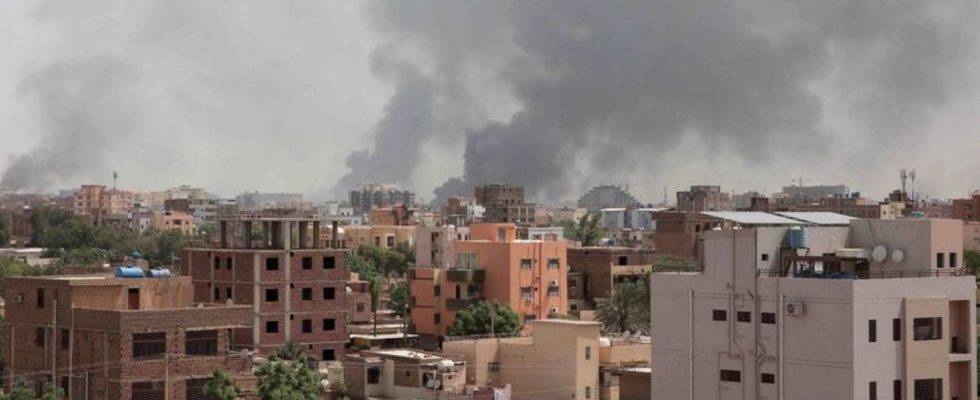North Africa
Power struggle in Sudan: Dozens dead after fierce fighting
Several people have already died in the fighting in Sudan. photo
© Marwan Ali/AP
The army and paramilitaries are fighting bitterly for power in Sudan. The fighting in the north-east African crisis country is killing more and more people – and is causing international horror.
Bitter fighting between armed forces and an influential paramilitary group in Sudan has plunged the north-east African country into a serious state crisis.
According to Sudanese doctors, by Sunday dozens had been killed and hundreds injured – and the trend is rising. More than 24 hours after the start of the fighting, neither the military nor the paramilitary Rapid Support Forces (RSF) were able to gain the upper hand by Sunday noon. Both sides reported individual successes and captured military bases. However, most of the information could not be independently verified.
The UN Security Council, in rare unity, called on all parties to the conflict to end the bloodshed and begin talks to end the crisis. In addition, humanitarian workers must be given safe access and UN employees must be protected, demanded the most powerful body in the United Nations. UN Secretary-General António Guterres, US Secretary of State Antony Blinken, EU High Representative for Foreign Affairs Josep Borrell and Foreign Minister Annalena Baerbock also called for an immediate end to the violence in Sudan.
Fighting apparently in several parts of the country
The building of the main military command in the capital Khartoum was particularly hard fought on Sunday, parts of which caught fire. The RSF said they have certain areas of headquarters under control. The Sudanese military dismissed this as a hoax. Instead, the army said the fire had been extinguished. There were no injuries. However, eyewitnesses report that the fighting there continued unabated. Heavy artillery and fighter jets are said to have been used. Fighting is also said to have broken out in other parts of the country, such as Darfur and North Kordofan provinces. Heavy fighting was also reported from the city of Merowe in the north of the country.
The background to the outbreak of violence is a bitter power struggle between the Sudanese ruler General Abdel Fattah al-Burhan and his deputy Mohammed Hamdan Daglo, the leader of the RSF. The conflict in the country with 46 million inhabitants escalated on Saturday, with fierce fighting erupting within a few hours. Artillery shelling, among other things, was reported from Khartoum, and there were also reports of air raids by the Sudanese air force on RSF bases. It is unclear who currently has the upper hand in Khartoum.
At least 56 civilian fatalities
A Sudanese medical organization said on Twitter on Sunday morning that there were at least 56 civilian deaths and dozens of soldiers killed. In addition, almost 600 injuries were counted in hospitals and other care centers, dozens of whom were in mortal danger.
Since the fall of long-term ruler Omar al-Bashir in 2019 and another coup against a civilian government that was set up as a result – but in fact controlled by the military – in 2021, the army has been in control of Sudan. The RSF and the Sudanese military had worked hand in hand in both takeovers. As part of the transition to civilian government planned for April, the paramilitaries were to be incorporated into the armed forces. This led to a power struggle between the former allies. Daglo accused al-Burhan of not wanting to give up his position as de facto head of state and of clinging to power contrary to all agreements.
The RSF claimed on Twitter late Saturday night that they had seized 90 percent of Sudan’s military-controlled areas and invaded the army’s command center. The army also rejected this as a false claim.
The escalation of violence sparked concern around the world. UN Secretary-General António Guterres called on the parties to the conflict “to cease hostilities immediately, restore calm and initiate dialogue to resolve the current crisis.” Guterres spoke to RSF General Daglo on the phone on Saturday. Foreign Minister Baerbock also called for an end to the violence in Sudan. “Both sides must stop fighting and prevent further bloodshed,” said the Green politician on Twitter on Sunday. She was “horrified by the many victims” and supported efforts to find a ceasefire.
The rhetoric of the opponents, on the other hand, gave little hope for a quick end to the violence: Al-Burhan had accused the RSF of attacks on strategic targets and on his house in an interview with the television channel Al-Jazeera on Saturday. RSF leader Daglo called for al-Burhan and his allies to be brought to justice. His rival is to blame for the conflict and will either be captured “or die like a dog,” Daglo told Al-Jazeera. The military circulated a statement on Facebook saying there would be no negotiations with the RSF and the group had to disband.
The RSF had mobilized their units a few days ago after the military again delayed the appointment of a prime minister and thus the handover of power. Observers interpreted the mobilization as a threatening gesture by Daglo against the commander-in-chief al-Burhan. Most recently, Daglo had called for a rapid transition to civilian government, opposing al-Burhan.
The RSF was formed in 2013 from militias in the western state of Darfur. During the decades-long conflict there, they were seen as brutal supporters of the Arab-dominated government, which used violence against the African minority. The group and its leader, Daglo, have been blamed for mass rapes and other gross human rights abuses. After the overthrow of ruler al-Bashir in 2019, Daglo was considered the most powerful man in Sudan. However, the affairs of state were taken over by al-Burhan, the inspector general of the armed forces. Daglo later became al-Burhan’s deputy in the ruling transitional council.

